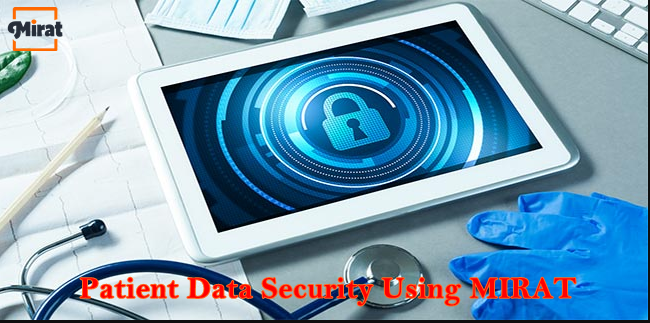Healthcare organizations can store thousands of patients—confidential information such as personal medical information, names, and addresses. The sensitive information for patients is very valuable for hackers. The health care sector has become the largest target for internet attacks through this abundant online database and network security, which is often insufficient. Here is where MIRAT comes in to picture and aligns patient data security with your working functionality.
Securing data of patients is complex because of the busy environment and the necessity for organizations to comply with HIPAA and GDPR. Read ahead the four approaches to decide for your healthcare organization the proper patient data protection solution.
The difficulty facing hospitals that seek to strengthen their network infrastructure is that their principal tasks are too busy to provide safety measures and controls in no time. You have to work in order to work as smoothly as possible. It is not practicable to overhaul the routines with which healthcare personnel are familiar in favour of a new safety procedure. In a time-critical business, it may create more damage than good.
Comply with safe software HIPAA and GDPR
An organization dealing with medical information in the US is required to conform to HIPAA — to ensure that personal patient information is not shared with or information to unauthorized persons. Compliance with HIPAA requires US Health Organizations to put appropriate ‘technical protections’ to ensure sensitive data is protected and gives any healthcare organization globally a reliable benchmark. Companies that do not comply risk being considerably fined.
In addition, the GDPR calls for the introduction of strong data security measures. The rule states that every corporation holding Personally Identifiable Information must provide EU individuals with reasonable data protection – and this has an important impact on healthcare organizations that register thousands of patient data.
Data protection legislation presents healthcare organizations with a different problem than cyber threats – but it can have equally catastrophic financial ramifications. Hospitals must invest in secure information protection solutions that help save on long-term expenditures due to failure to comply with government criteria.
IT personnel must maintain secure data for their organization. Anything alternative that is easy to integrate and upgrade the workforce will save time and effort. Technologies like Multi-Factor Authentication (MFA) combine the way an organization wants to work with various devices. This is easier for hospital employees to roll out, as they do not move too far from their regular work patterns. MFA requires users to avoid intruders from entering patient data for multiple user names and passwords such as a password and one-off code.
MIRAT relies exclusively on risk-based authentication for its personnel. Based on criteria such as IP address, positioning and the device used to connect to a network, the solution evaluates the danger of each login attempt. If a user’s activity is considered odd, a high level of authentication will be requested for additional security.Mirat.ai is now an artificial intelligence-driven cloud software capable of providing all the packaged tools under one license, offering centralized self-service capabilities with No/minimum staff and remote monitoring capabilities that presently no other competitor is able to serve. The USP of MIRAT.ai is “Automation” of IT infrastructure management that is highly aligned with ITIL and current trends. The IT infrastructure management includes but is not limited to the operating system, database, network, storage, application, middleware spaces etc.
Mirat.ai’s IT Infrastructure Management is Affordable & Easy to use! Get your Dashboard ready in only 5 Minutes. Request for Trial/Demo now (or) Contact our Team Now .
Contact Information:
Hema
Sales Executive
Phone: +1-315-636-4213
Email: sales@mirat.ai
Website: https://www.mirat.ai/


